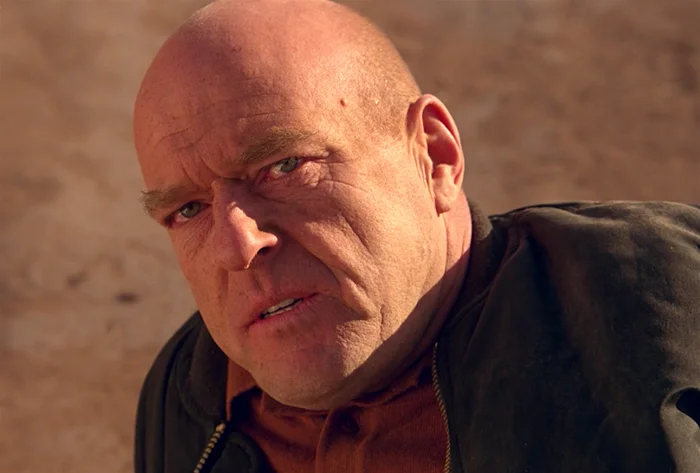Breaking Bad, one of the most iconic television series of all time, created by Vince Gilligan, tells the story of Walter White’s descent into the criminal underworld. Alongside the evolution of Walter’s character, the show also features a rich ensemble cast, with Hank Schrader being one of the most compelling. Played by Dean Norris, Hank’s journey is marked by humor, resilience, and ultimately, tragedy. His death in the series remains one of the most shocking moments for fans of the show. This article will examine the significance of Hank Schrader’s death, when it happens in the show, and the impact it has on the storyline and characters around him.
Who Is Hank Schrader?
Hank’s Role in Breaking Bad
Hank Schrader, Walter White’s brother-in-law, is introduced as a tough, no-nonsense DEA agent with a sense of humor and an indomitable spirit. Initially, he serves as a source of comic relief, but as the show progresses, his character undergoes significant development. Hank’s knowledge of the drug trade and his dedication to bringing down drug dealers make him a formidable force. However, Hank’s greatest strength – his integrity – also leads to his downfall.
The Duality of Hank’s Character
While Hank is a lawman, he also possesses a certain level of vulnerability, especially in his relationship with his wife, Marie, and his admiration for his brother-in-law, Walter. Throughout the series, Hank serves as a contrast to Walter. Where Walter is increasingly willing to break the law and cross moral boundaries, Hank remains committed to justice. His death, therefore, is not only a loss to the story but a poignant moment that highlights the irreversible changes in the lives of the characters.
Hank’s Death: The Turning Point in Breaking Bad
The Events Leading to Hank’s Death
Hank’s death occurs in Season 5, Episode 14, titled “To’hajiilee.” This episode marks a pivotal point in the show, bringing many storylines to their climactic end. The tension between Hank and Walter has been building for several seasons, but it reaches a boiling point when Hank discovers the truth about Walter’s secret life as a drug kingpin.
The Confrontation at the Desert
Hank’s death occurs in the desert after a dramatic confrontation between Hank, Walter, and Jack Welker’s white supremacist gang. After Hank and his partner, Steven Gomez, successfully track down Walter’s drug money, they find themselves surrounded by Jack’s gang. Walter pleads with Hank to let the situation go, offering to make things right by giving the gang everything they want. However, Hank, undeterred by Walter’s pleas, refuses to back down and prepares to fight for his life.
The tragic moment unfolds when Hank refuses to beg for his life and faces his death with courage, declaring that he is “not afraid” before being shot in cold blood by Jack Welker. This scene is one of the most emotional and harrowing in the entire series, marking the tragic end of Hank’s arc and forever altering the trajectory of Walter’s journey.
The Significance of Hank’s Death
Hank’s death is not just a turning point in Breaking Bad, it also serves as a mirror to Walter’s own transformation. At the beginning of the series, Walter was a high school chemistry teacher who made choices out of desperation. However, by Season 5, Walter has fully embraced his Heisenberg persona, and Hank’s death is the ultimate consequence of Walter’s choices. In this moment, Walter is forced to confront the cost of his actions and the irreparable damage he has done.
The Aftermath of Hank’s Death
The Impact on the Family
Hank’s death has a profound effect on his family, particularly his wife, Marie, and his sister-in-law, Skyler. For Marie, losing her husband is devastating, and she struggles to process her grief in the aftermath. For Skyler, Hank’s death represents the final unraveling of her family. The loss of Hank compounds her feelings of helplessness and fear, as she now realizes the depth of the danger her family is in due to Walter’s criminal activities.
The Consequences for Walter
Walter’s actions, culminating in Hank’s death, force him to reckon with the fallout of his double life. For all his intelligence and careful planning, Walter is ultimately unable to escape the consequences of his decisions. Hank’s murder marks the beginning of the end for Walter, as his carefully constructed empire begins to crumble. The guilt that Walter feels, though never fully acknowledged, plays a critical role in his eventual demise.
Hank’s Legacy in Breaking Bad
Although Hank’s death occurs towards the end of the series, his influence reverberates throughout the remainder of Breaking Bad. His determination and sense of justice stand in stark contrast to Walter’s moral decay, and his death serves as a stark reminder of what has been lost. Hank’s legacy also lives on through his relationship with Walter and the other characters. For Jesse Pinkman, Hank’s death is another tragic reminder of the violence that Walter has brought into their lives. For Skyler and Marie, it becomes a symbol of Walter’s betrayal and the irreparable damage he has caused.
Conclusion
Hank Schrader’s death in Breaking Bad is one of the most shocking and emotional moments in television history. It marks a critical turning point for both the characters and the story itself. As the tragic consequences of Walter White’s actions unfold, Hank’s death serves as a poignant reminder of the personal costs of living a criminal life. Through his courageous final moments, Hank leaves behind a legacy of honor, justice, and sacrifice, making his death one of the most significant events in Breaking Bad.

